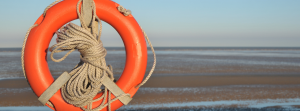Murder is one of the three cardinal sins for which one must forfeit one’s own life before taking the life of another. If someone holds a gun to your head and says to kill the person in front of you or I’ll kill you, you must choose your own death over killing another.
The Talmud explains the reason for this law; “who says your own ‘blood is thicker’ than the other person’s blood, perhaps his ‘blood is thicker’ than yours?!” This means that you have no way of knowing who is more important in the eyes of G-d and therefore do not have the right to take another’s life for the sake of your own.
The commentators explain that this Talmudic ruling applies only if you are told to perform an action to kill the other person. If, however, the gunman tells you to not move and he is going to throw you onto another person in a way which will kill the other, you need not forfeit your life to prevent that occurrence. Since you will be performing no action, you are like “the axe in the hand of the chopper.” It is the chopper doing the chopping and the axe is merely an extension of his hand. In that case you may apply the opposite reasoning: who says the other’s blood is thicker; maybe your blood is thicker!
A similar ruling is found in reference to the question of two Jews walking in the desert, one with a flask of water and one with nothing. There’s only enough water for one of them to make it to the village; if they both drink they both will die before they make it. One opinion is that he should share the water and his friend drink – and they will both die. The final ruling is in accordance with the opinion of Rabbi Akiva. He learns from the verse “your brother should live with you” which teaches that your own life precedes the life of another. You have the right to drink your own water and live even though the other person will die.
This is because you are not performing an act to kill the other; you are only passively doing so by saving yourself.
Fascinating, heart wrenching questions arose on these lines in the concentration camps; was one permitted to get himself excused from a list of people doomed to the crematoria if to do so would necessarily mean his place would be filled by another; is that considered an active or passive taking of another’s life? This question is discussed at length by holocaust-era authorities, recording the answers they gave when this question was actually posed to them!
In your theoretical case, the driver of the car is performing no action to bring the car onto the other to save himself; even braking would not stop the car in time to save him. He therefore would not be obligated to drive off the cliff to save the cyclist, who put himself in the path of danger, and therefore, sadly, should continue on his course although that means taking the life of the cyclist.
Sincerely,
Rabbi Yerachmiel Fried


